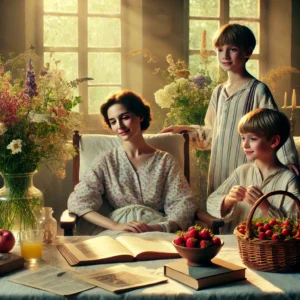1st PUC English Question and Answer: Two Gentlemen of Verona
Looking for 1st PUC English textbook answers? You can download Chapter 12: Two Gentlemen of Verona Questions and Answers PDF, Notes, and Summary here. 1st PUC English solutions follow the Karnataka State Board Syllabus, making it easier for students to revise and score higher in exams.
Karnataka 1st PUC English Textbook Answers—Reflections Chapter 12
Two Gentlemen of Verona Questions and Answers, Notes, and Summary
1st PUC English Chapter 12
Two Gentlemen of Verona
Scroll Down to Download The Gentlemen of Verona PDF
Two Gentlemen of Verona Comprehension I:
Question 1.
Where does the narrator first meet the two boys?
Answer:
The narrator first meets the two boys on the outskirts of Verona.
Question 2.
Why doesn’t the driver approve of the narrator buying fruit from the two boys? Does he succeed?
Answer:
The driver, Luigi, advises the narrator that they could get better-quality fruits in Verona. However, the narrator still decides to buy the biggest basket of fruit from the boys.
Question 3.
List the different things the boys did to earn their living.
Answer:
The boys sold wild strawberries and bright scarlet berries, which looked appealing against the dark green leaves in their wicker baskets. They also worked as guides, shoe shiners, and errand runners.
Question 4.
Despite working hard and earning money, the two boys still looked poor because:
(a) They were saving money to go to America.
(b) They had other plans.
(c) They wanted to fulfil other plans.
Answer:
(a) They were saving money to go to America.
Question 5.
What qualities in the two boys attracted the narrator?
Answer:
The two boys were resourceful, cheerful, and competent. They fulfilled every need of the narrator and his group, whether it was arranging a pack of American cigarettes, securing opera seats, or suggesting a good restaurant.
Question 6.
Nicola is not pleased when Jacopo asks the narrator to drive them to Poleta as he:
(a) Did not want a stranger to become involved with their plans.
(b) Preferred going to Poleta by train so that he could enjoy the scenery.
(c) Did not want to ask anyone for favours.
(d) Did not want to take help from someone he did not know well.
Answer:
(d) Did not want to take help from someone he did not know well.
Question 7.
Why did the two boys go to Poleta, and why did they want the narrator not to follow them?
Answer:
The two boys went to Poleta to visit their sister, who was undergoing treatment in a hospital. They did not want the narrator to follow them, as they preferred to keep their situation private.
Question 8.
The narrator did not follow the boys because:
(a) He was not invited to join them.
(b) He was not interested in knowing what the boys were up to.
(c) He wanted to respect their privacy.
Answer:
(c) He wanted to respect their privacy.
Question 9.
What had made the two boys and their sister homeless?
Answer:
The boys’ father, a widower and a well-known singer at La Scala, was killed during the war. Shortly afterwards, a bomb destroyed their home, leaving the three children homeless.
Question 10.
What does the narrator learn from Lucia’s nurse?
Answer:
From Lucia’s nurse, the narrator learns about the boys’ sacrifices and their dedication to their sister. The nurse speaks with deep emotion about how the boys have been working tirelessly to pay for Lucia’s treatment, showcasing their love and responsibility.
Question 11.
The author did not speak to the boys on their return journey because he thought:
(a) The boys would prefer to keep their secret.
(b) The boys were ashamed of their sister’s condition.
(c) They wouldn’t tell him the truth.
(d) The boys might ask him for money for their sister’s treatment.
Answer:
(a) The boys would prefer to keep their secret.
Two Gentlemen of Verona Comprehension II:
Question 1.
In what different ways were the boys useful to the narrator?
Answer:
The boys were resourceful and helpful in many ways. They could arrange for American cigarettes, secure opera seats, or recommend a good restaurant. They were reliable and cheerful, always eager to assist the narrator.
Question 2.
What do you understand about the boys’ character from their actions and behaviour?
Answer:
The boys were hardworking, determined, and selfless. Despite their young age, they exhibited immense maturity and responsibility. Their dedication to supporting their sister and their cheerful demeanour despite hardships reflect their resilience and strength of character.
Question 3.
The boys are evasive in disclosing their plan to the narrator in the story because:
(a) They thought he could never understand their plight.
(b) They did not want to share their problem with a stranger.
(c) They did not want to gain anybody’s sympathy.
Answer:
(b) They did not want to share their problem with a stranger.
Two Gentlemen of Verona Comprehension III:
Question 1.
Do you think the ending comes as a surprise? Why?
Answer:
The boys returned to the narrator and sat silently beside him, radiating a calm sense of contentment. The narrator chose not to ask questions, understanding their wish to guard their secret. Despite their silence, the unwavering devotion of the boys deeply moved him. The ending wasn’t entirely surprising, but it revealed the depth of their character in a profound way.
Question 2
Had you been in the place of the narrator, would you have behaved differently?
Answer:
Yes, I might have reacted differently. I would have initiated a conversation with the boys, offering them comfort and support to ease their burdens.
Question 3
‘Appearances are deceptive.’ How does the story bring out this idea?
Answer:
The two boys had a shabby appearance—one wore a worn-out jersey and khaki shorts, while the other had an oversized army tunic draped loosely over his frail body. Their tangled hair, brown skin, and solemn eyes painted a picture of poverty and hardship.
However, as the narrator grew closer to them, he discovered their extraordinary resilience and selflessness. Despite their outward poverty, the boys displayed remarkable strength of character. They spent little on themselves, eating modest meals of black bread and figs, while secretly dedicating their efforts to their sister’s recovery. Their true nobility lay not in their looks but in their actions.
Question 4
‘War may destroy one’s home but not one’s heart.’ Discuss this statement regarding the story of the two boys.
Answer:
The war had inflicted immense suffering on the boys. They lost their father, a renowned singer at La Scala, and a bomb destroyed their home, leaving them and their sister Lucia homeless. Once accustomed to a life of comfort, they struggled to survive amidst the ruins, battling hunger and the harsh winter.
During the German occupation of Verona, they experienced the brutal rule of the Elite Guard. Despite their hardships, the boys joined the resistance movement with unwavering courage.
After the war, they found their sister gravely ill with spinal tuberculosis, a consequence of the war’s horrors. Instead of succumbing to despair, the boys devoted their lives to ensuring her recovery.
They admitted her to a hospital and worked tirelessly to support her treatment. While the war shattered their home, it could not break their spirit. Their bravery and unwavering hope stood as a testament to the resilience of the human heart.
Question 5
Do you think the story is a telling comment on the true character of a gentleman? Elaborate.
Answer:
The narrator deeply respects the boys’ attitude and unwavering dedication to their responsibilities. He admires their hard work and is moved by their selfless commitment to their sister. Despite understanding their struggles, he refrains from asking questions, honouring their privacy and emotions. This quiet respect and empathy exemplify the true character of a gentleman.
Two Gentlemen of Verona Comprehension Additional Questions and Answers:
Question 1.
What did the boys sell?
Answer:
The boys sold wild strawberries, bright scarlet berries that stood out beautifully against the dark green leaves in their wicker basket. They also sold newspapers.
Question 2.
What are the names and ages of the boys mentioned in the story?
Answer:
The elder boy, Nicola, was thirteen, and his younger brother, Jacopo, was twelve.
Question 3.
Who discovered that they were brothers?
Answer:
The narrator’s companion was the one who discovered that the two boys were brothers.
Question 4.
Where did the boys go every Sunday? How did they travel?
Answer:
Every Sunday, the boys travelled to Poleta, 30 kilometres away, to visit their sister. They usually made the journey by hiring bicycles.
Question 5.
Who requested the narrator to send them in his car?
Answer:
Jacopo, the younger brother, requested the narrator to send them in his car.
Question 6.
What items were found in the girl’s room?
Answer:
A vase of wildflowers adorned her table, accompanied by a dish of fresh fruit and several books.
Question 7.
What was the sister’s age?
Answer:
The sister, Lucia, was twenty-two years old.
Question 8.
What illness did their sister suffer from?
Answer:
Lucia was afflicted with tuberculosis of the spine, a condition she contracted during the hardships of the war.
Question 9.
What message does this story convey to the world?
Answer:
The story highlights the boys’ selfless actions, showcasing a profound sense of humanity and offering hope for a better, more compassionate society.
Question 10.
What deeply moved the narrator while driving them back?
Answer:
The narrator was profoundly touched by the silent yet powerful display of the boys’ youthful devotion and unwavering love for their sister.
Question 11.
How did the boys care for their sister?
Answer:
The boys ensured Lucia received proper care by persuading the doctors to admit her to the hospital. Over the past year, they have consistently paid for her treatment, and her condition has significantly improved. There is great hope that one day she will recover fully, regain her ability to walk and pursue her passion for singing.
Two Gentlemen of Verona Summary
The story revolves around two young brothers, Nicola and Jacopo, who display remarkable maturity and resilience in the face of life’s challenges. When the narrator first meets them selling wild strawberries, he is unaware of the hardships they endure.
Despite their young age, the boys work tirelessly, doing various odd jobs such as selling newspapers and fruits. Their relentless efforts are not only for their survival but also to care for their elder sister, Lucia, who suffers from tuberculosis of the spine. Every week, they save up their earnings to visit her at the hospital on Sundays.
Lucia, once a promising singer, shares her story with the narrator. She reveals how the war with Germany devastated their family, leaving them orphaned and homeless. Despite losing their parents and their once-prosperous life, the boys refused to give up. Their selfless devotion gave her hope and strength to endure her illness.
Lucia views her brothers as a blessing, calling them extraordinary for their courage and dedication. The story conveys a powerful message about love, sacrifice, and the unbreakable human spirit in the face of adversity.

